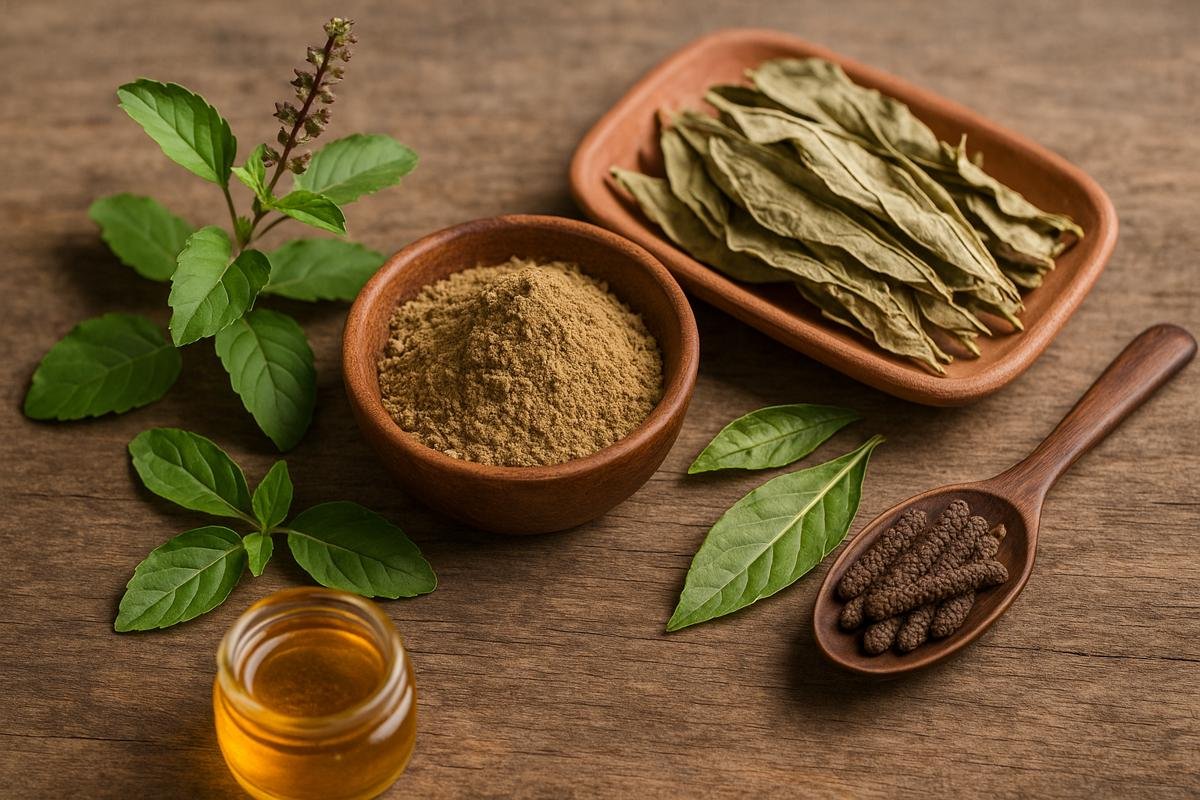Struggling with wheezing, shortness of breath, or seasonal bronchitis? You’re not alone. In Ayurveda, respiratory disorders like chronic asthma and allergic bronchitis are often linked to an imbalance in the vata and kapha doshas. Fortunately, ancient Ayurvedic wisdom offers a range of natural remedies and herbs to help you breathe easier—without the side effects of conventional medications.
Understanding the Vata-Kapha Imbalance
Ayurveda identifies vata (air and space) and kapha (water and earth) as key players in respiratory health. In conditions like asthma and bronchitis, excess kapha blocks the airways with mucus, while aggravated vata causes spasmodic breathing and dry coughs.
Common symptoms of vata-kapha imbalance:
• Chest congestion
• Breathlessness
• Dry or productive cough
• Wheezing
• Fatigue after minimal exertion
Key Ayurvedic Herbs for Respiratory Relief
Tulasi (Holy Basil)
A potent adaptogen and natural bronchodilator, tulasi helps clear respiratory congestion, reduces allergic responses, and soothes inflammation in the lungs. Steam inhalation with tulasi leaves or tulasi essential oil is a powerful remedy to open blocked sinuses and airways.
How to use: Boil fresh tulasi leaves in water, cover your head with a towel, and inhale the steam deeply for 5–10 minutes.
Vasaka (Malabar Nut)
Known in Ayurveda as Vasa, this herb is a go-to remedy for chronic respiratory ailments. It has strong expectorant and bronchodilatory properties, making it ideal for reducing breathlessness and clearing mucus.
How to use: Vasaka powder can be taken with honey or as part of an herbal blend like Sitopaladi Churna.
Pippali (Long Pepper)
This warming spice stimulates digestion and clears ama (toxins), while also acting as a lung tonic. Pippali enhances the bioavailability of other herbs and helps in breaking down stubborn kapha buildup in the lungs.
How to use: Add a pinch to warm water or combine with honey for a natural expectorant.
Pranayama: Breathe with Awareness
In addition to herbal remedies, pranayama (yogic breathing exercises) plays a crucial role in managing asthma and bronchitis. Practices like Anulom-Vilom (alternate nostril breathing) and Bhramari (bee breath) help:
• Improve lung capacity
• Reduce stress-induced flare-ups
• Increase oxygenation
Daily practice of pranayama calms the vata dosha and reduces the tendency for airway spasms.
Featured Product: Sitopaladi Churna
Sitopaladi Churna is a classical Ayurvedic formulation known for its ability to:
• Relieve chronic cough and asthma
• Soothe throat irritation
• Improve respiratory function
How to use: 1–2 grams with honey, 2–3 times a day, or as directed by your Ayurvedic practitioner.
Product link: Sitopaladi Churna
Free Online Ayurvedic Doctor Consultation
Want a personalized approach to your healing journey?
Click here to get your Free Online Ayurveda Consultation.
Final Thoughts
Living with chronic asthma or allergic bronchitis doesn’t have to mean dependency on inhalers or steroids. By embracing the holistic and time-tested wisdom of Ayurveda—including tulasi steam inhalation, vasaka and pippali, and pranayama—you can take control of your breath, naturally.
Start your healing journey today with trusted herbal support like Sitopaladi Churna, and let your breath flow freely once again.
This article is for information only and is not a substitute for professional medical advice.






